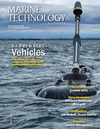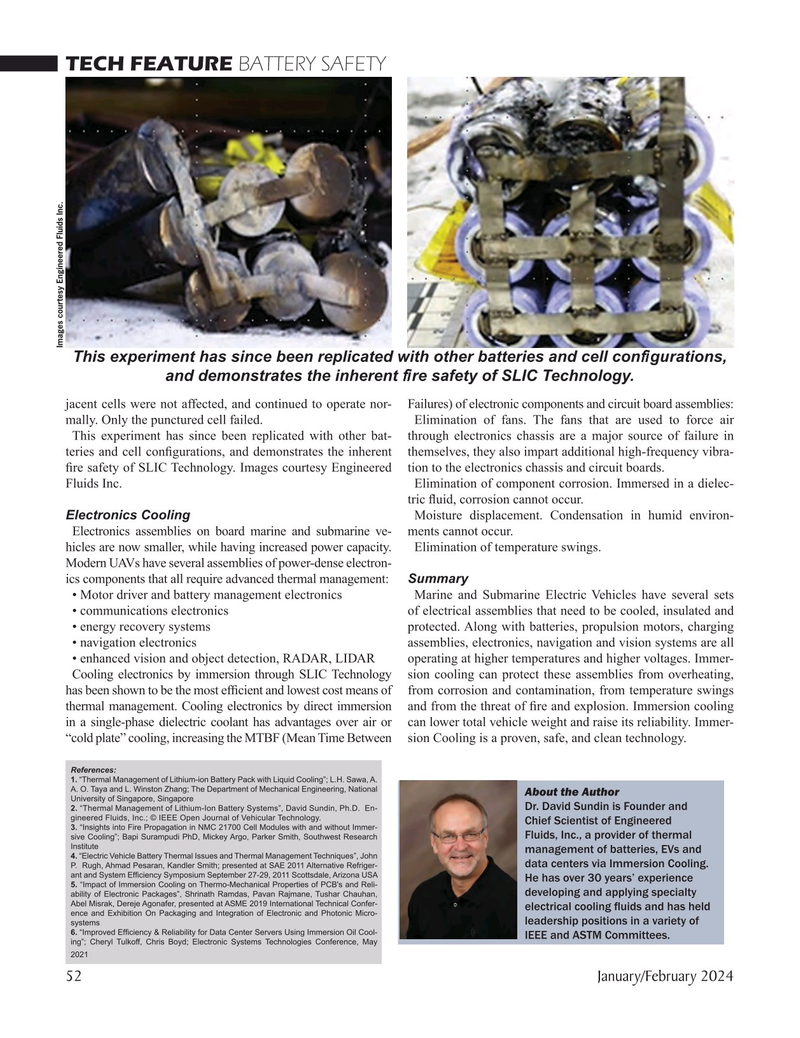
Page 52: of Marine Technology Magazine (January 2024)
Read this page in Pdf, Flash or Html5 edition of January 2024 Marine Technology Magazine
TECH FEATURE BATTERY SAFETY
Images courtesy Engineered Fluids Inc.
This experiment has since been replicated with other batteries and cell con? gurations, and demonstrates the inherent ? re safety of SLIC Technology.
jacent cells were not affected, and continued to operate nor- Failures) of electronic components and circuit board assemblies: mally. Only the punctured cell failed. Elimination of fans. The fans that are used to force air
This experiment has since been replicated with other bat- through electronics chassis are a major source of failure in teries and cell con? gurations, and demonstrates the inherent themselves, they also impart additional high-frequency vibra- ? re safety of SLIC Technology. Images courtesy Engineered tion to the electronics chassis and circuit boards.
Fluids Inc. Elimination of component corrosion. Immersed in a dielec- tric ? uid, corrosion cannot occur.
Electronics Cooling Moisture displacement. Condensation in humid environ-
Electronics assemblies on board marine and submarine ve- ments cannot occur.
hicles are now smaller, while having increased power capacity. Elimination of temperature swings.
Modern UAVs have several assemblies of power-dense electron- ics components that all require advanced thermal management: Summary • Motor driver and battery management electronics Marine and Submarine Electric Vehicles have several sets • communications electronics of electrical assemblies that need to be cooled, insulated and • energy recovery systems protected. Along with batteries, propulsion motors, charging • navigation electronics assemblies, electronics, navigation and vision systems are all • enhanced vision and object detection, RADAR, LIDAR operating at higher temperatures and higher voltages. Immer-
Cooling electronics by immersion through SLIC Technology sion cooling can protect these assemblies from overheating, has been shown to be the most ef? cient and lowest cost means of from corrosion and contamination, from temperature swings thermal management. Cooling electronics by direct immersion and from the threat of ? re and explosion. Immersion cooling in a single-phase dielectric coolant has advantages over air or can lower total vehicle weight and raise its reliability. Immer- “cold plate” cooling, increasing the MTBF (Mean Time Between sion Cooling is a proven, safe, and clean technology.
References: 1. “Thermal Management of Lithium-ion Battery Pack with Liquid Cooling”; L.H. Sawa, A.
A. O. Taya and L. Winston Zhang; The Department of Mechanical Engineering, National
About the Author
University of Singapore, Singapore
Dr. David Sundin is Founder and 2. “Thermal Management of Lithium-Ion Battery Systems”, David Sundin, Ph.D. En- gineered Fluids, Inc.; © IEEE Open Journal of Vehicular Technology.
Chief Scientist of Engineered 3. “Insights into Fire Propagation in NMC 21700 Cell Modules with and without Immer-
Fluids, Inc., a provider of thermal sive Cooling”; Bapi Surampudi PhD, Mickey Argo, Parker Smith, Southwest Research
Institute management of batteries, EVs and 4. “Electric Vehicle Battery Thermal Issues and Thermal Management Techniques”, John data centers via Immersion Cooling.
P. Rugh, Ahmad Pesaran, Kandler Smith; presented at SAE 2011 Alternative Refriger- ant and System Ef? ciency Symposium September 27-29, 2011 Scottsdale, Arizona USA
He has over 30 years’ experience 5. “Impact of Immersion Cooling on Thermo-Mechanical Properties of PCB's and Reli- developing and applying specialty ability of Electronic Packages”, Shrinath Ramdas, Pavan Rajmane, Tushar Chauhan,
Abel Misrak, Dereje Agonafer, presented at ASME 2019 International Technical Confer- electrical cooling ? uids and has held ence and Exhibition On Packaging and Integration of Electronic and Photonic Micro- leadership positions in a variety of systems 6. “Improved Ef? ciency & Reliability for Data Center Servers Using Immersion Oil Cool-
IEEE and ASTM Committees. ing”; Cheryl Tulkoff, Chris Boyd; Electronic Systems Technologies Conference, May 2021 52 January/February 2024
MTR #1 (50-63).indd 52 1/31/2024 8:35:56 AM

 51
51

 53
53
